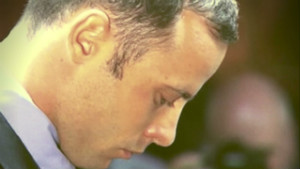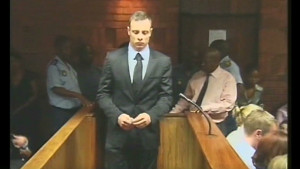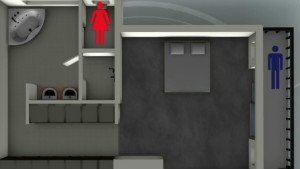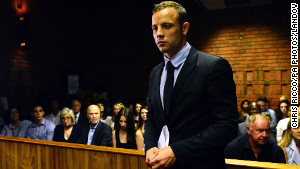Pretoria, South Africa (CNN) -- A magistrate granted bail Friday to Oscar Pistorius, citing a number of problems with the police investigation into the death of the Olympic sprinter's girlfriend.
"I come to the conclusion that the accused has made a case to be released on bail," said Chief Magistrate Desmond Nair, eliciting a celebratory cry of "Yes!" from the courtroom.
Nair said the former chief investigator in the case, Hilton Botha, had made "several errors and concessions" during his testimony.
Specifics of Pistorius' release have not yet been announced.
The decision comes at the end of a four-day bail hearing that has been remarkable for not only its length, but also its allegations of miscues by a lead police investigator who himself faces attempted murder charges.
Tweets from @cnni/oscar-pistoriusRead more: What's life like in a South African prison?
Pistorius is accused of premeditated murder in the February 14 shooting death of Reeva Steenkamp, 29. Authorities and Pistorius' team agree that he killed Steenkamp, but Pistorius says he mistook her for an intruder.
Prosecutor Gerrie Nel told the judge in final arguments before a packed Pretoria courtroom that Pistorius didn't deserve bail.
"He must realize that long-term imprisonment is almost guaranteed. He might think he'll be acquitted."
The prosecution had several notable missteps during the bail hearing, including the removal of the lead investigator, who had earlier acknowledged under questioning from defense attorney Barry Roux that police could have contaminated the crime scene and had failed to properly catalog evidence.
The South African Police Service pulled Botha, from the case Thursday after prosecutors reinstated seven counts of attempted murder charges against him. Botha is accused of opening fire on a minibus full of people while allegedly drunk in 2011.
Read more: Nike's bullet ad with Pistorius backfires
Prosecutors allege that Pistorius, 26, killed his girlfriend after a heated argument in the early morning hours of Valentine's Day.
The sprinter, however, says he thought an intruder was hiding in a toilet room inside the bathroom of his Pretoria home. He says he fired into the room in a fit of terror before realizing Steenkamp was inside.
In full: Pistorius' affidavit to court
Prosecution plea
Nair questioned Nel over the prosecution's assertion that Pistorius was a flight risk.
What kind of life would he lead if he were to flee? the judge asked.
A life of freedom, the prosecutor said.
Ducking and diving every day with those prosthesis? Nair asked.
A life not in prison, Nel said.
 Covering the Oscar Pistorius case
Covering the Oscar Pistorius case  Pistorius back in court; investigator out
Pistorius back in court; investigator out  Judge, not jury, decides Pistorius case
Judge, not jury, decides Pistorius case  Take a virtual look at Pistorius' defense
Take a virtual look at Pistorius' defense The prosecutor implored the judge to deny Pistorius' bail request, saying courts cannot favor the famous or the disabled.
"We all know that a lot of important people were granted bail and they stayed in the country," Nel told the magistrate. "But lots of very important people have escaped."
Nel pointed to the case of WikiLeaks founder Julian Assange, who fled to the Ecuadorian Embassy in London to avoid extradition to Sweden, where he is wanted for questioning over sex assault allegations.
Assange's face was well-known, the prosecutor said, but "it didn't stop him fleeing arrest."
Roux said the track star needs regular medical treatment for his stumps and his prostheses require routine maintenance.
"Mr. Pistorius cannot go unnoticed through an airport due to his legs," he told the judge.
Pistorius, eyes red, appeared emotional and drained.
At one point, he sat with his eyes closed and shoulders shaking as tears rolled down his face. At other times, he stared straight ahead.
In arguments wrapping up during Thursday's session, the prosecutor said Pistorius' defense team has failed to explain why investigators found two cell phones and the gun believed to have been used in the shooting in front of the shower.
That goes to the prosecution claim that Steenkamp didn't merely get up to relieve herself in the middle of the night, but in fact had locked herself in the bathroom with her cell phone to protect herself from Pistorius.
Earlier in the hearing, Nel argued that evidence showed Pistorius intentionally targeted Steenkamp. Ballistic evidence showed he had to aim at the toilet to hit her, Nel said, and how the bullets traveled through the door suggested he was standing on his prosthetic legs, not his stumps as he claimed.
Pistorius said in his statement that when he shot through the door, he was feeling vulnerable to an intruder because he was not wearing his legs and had limited mobility.
Defense argument
During the bail hearing, being held in a dark, stuffy Pretoria courtroom, Roux hammered away at the credibility of Botha and the entire police investigation. He argued Thursday that the state's case had suffered a "monumental collapse."
 Pistorius' friend: Oscar is innocent
Pistorius' friend: Oscar is innocent  Friend: Reeva was a very happy person
Friend: Reeva was a very happy person He said police had missed a bullet where Steenkamp was shot and may have contaminated the crime scene by failing to wear protective foot covers.
Botha said investigators didn't wear the booties because they'd run out.
Under questioning from Roux, Botha said police didn't have evidence to specifically contradict Pistorius' story.
Then, Botha was gone.
Officials in the case learned Thursday of the charges against Botha, and the South African Police Service moved quickly to take him off the investigation.
While police Commissioner Riah Phiyega praised Botha's work on the case, she removed him in favor of the department's most senior detective.
Accusations against the investigator would be little more than a "speed bump" in the Pistorius case, Bulelwa Makeke, the spokeswoman for South Africa's National Prosecuting Authority, said before Botha was removed.
"Blade Runner"
Pistorius made history last year as the first disabled athlete to compete in the able-bodied London Games. A few weeks after the Olympics, he smashed a record to win the men's 400-meter in the 2012 Paralympic Games.
When Pistorius was 11 months old, his legs were amputated below the knees because he was missing the fibulae.
He runs on special carbon fiber blades, earning the nickname "Blade Runner."
The case has roiled South Africa, where Pistorius is considered a national hero.
Following his arrest on Valentine's Day, Pistorius put his career on hold and pulled out of future races. Sponsors Nike and Oakley suspended their contracts with the runner.
CNN iReport: What my son taught me about Oscar Pistorius
{ 0 comments... read them below or add one }
Post a Comment